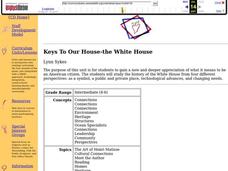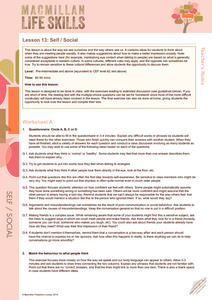Curated OER
Walking With Thoreau
Students engage in a series of activities geared towards studying the author Henry David Thoreau. They use different sources to obtain information to create context for future lessons. Students attempt to model their own lives to that of...
Curated OER
Have and Have-Not
Students describe the differences of people living in developed and underdeveloped countries. They also identify how each type of country uses their resources. They develop an ecological footprint of the countries discussed.
Curated OER
Foreign Travel
Eighth graders visit the website of the U.S. embassy of a different country, and gather information that would be important for them to know if they were going to travel there.
Curated OER
Keys To Our House-the White House
Students explore the history of the White House from four different perspectives: as a symbol, a public and private place, technological advances, and changing needs. They take a virtual tour of the White House and explore its history....
Curated OER
ADULT ESOL LESSON PLAN--Level 5--Consumer Education
Students focus on identifying the differences between automobile, property, and health insurances. They also review the different cost for each and view a variety of brochures. In addition, they chart their findings to visualize all...
Curated OER
It's Fun to Learn!
Pupils use the macro mode of the OLYMPUS FE-140 CAMERAS as virtual microscopes to explore different habitats, observe plants, soil, and insects and other creatures. They download those images on electronic files and build web pages. They...
Curated OER
Caterpillars - Page 3
Students explore patterns and how they repeat. They explore the different types of patterns (color, numbers, shapes, letters, etc.)
K12 Reader
Bartering for Basics
A passage about bartering practiced by early Native American tribes provides the text for a reading comprehension worksheet that asks kids to use information from the article to answer a series of comprehension questions.
Curated OER
The Breaking of Charity
The danger of mob mentality is on display in The Crucible by Arthur Miller. Get your class thinking with some challenging quickwrite questions, then assign characters from the play to be read aloud altogether. Links to worksheets for...
Curated OER
Moving and Grooving with Tempo
Students participate in activities involving folk music using movement to illustrate the musical concept of tempo. The use of a game is used in order to help maintain student involvement in the lesson.
Curated OER
Appreciating Diversity: A Multicultural Lesson Based on the Traditional Clothing of the Maya
Students compare the traditional Mayan clothing to their everyday clothing. In this multicultural appreciation instructional activity, students look at images of traditional Mayan clothing and discuss its importance.
Curated OER
East Asia & The World
Students discuss the relationships between East Asia and the United States. They examine the importance of trade and politics. They examine graphs and charts of certain aspects of the region and discuss.
Curated OER
Thomas Edison's Inventions in the 1900s and Today: From "New" to You!
Students research types of technology available to Americans at the beginning of the 20th century and compare the style of living to modern times. They identify Thomas Edison's contributions to technology and their own current lifestyles.
Curated OER
A Historical and Educational Perspective on American Sign Language
Using Sign Language to Communicate with Your Special-Needs Students in the Classroom
Curated OER
Sexual Stereotypes in Japan
High schoolers are introduced to the various stereotypes faced by women in Japan. In groups, they discover the types of discrimination women received because of the stereotypes and how they have confronted them over time. They develop...
Curated OER
If At First You don't Succeed Try, Try Core Knowledge!
Students relate phrases and sayings to their life experiences. In this phrases and sayings lesson, students participate in activities and listen to stories to understand the meanings of each saying. One day is devoted to each saying.
Curated OER
On the Road with Marco Polo: From Hormuz to Venice
Students study the route from Hormuz to Constantinople that was traveled by the Polos. They explain the importance of Constantinople in medieval time and discuss its location, and outer wall structure.
Macmillan Education
Self/Social
Body language, our perception of others, and how to make a better impression socially are the focus topics for this lesson, which is part of a 23-lesson series on building important life skills. Learners complete a questionnaire on...
Curated OER
I Am Special and You Are Special Too
Pre-schoolers identify things that make them a special individual. In this diversity instructional activity, they read the book Little Gorilla and discuss ways they are special and unique. Children create a birthday party for "Little...
Curated OER
Cartography Project
A instructional activity involving mapping, the use of a compass, writing and following directions, and exploring the first two themes of geography is here for you. Learners create original maps that show the routes they take through...
Curated OER
Reading Comprehension: Nepal
It's important to build reading comprehension in your growing learners whether English is their native language or not. Give your eighth and ninth graders this passage about Nepal, a small country north of India. The reading comes with...
Curated OER
Arizona Plant Booklet: An Introduction to Arizona Plants & Cacti
Young scholars explore variety of plants & cacti in their Arizona community by collecting samples and taking photographs. Can be adapted to other areas.
Curated OER
On the Road with Marco Polo: Sea Voyage to India
Students examine Marco Polo's route from China to Sumatra. They investigate the geography and climate, the religions and architecture of modern Indonesia. They study the use of spices and why they were so important in medieval times.
Redefining Progress
Have and Have-Not
Is there a correlation between a country's wealth and the extent of its ecological footprint? What exactly constitutes an ecological footprint, and how does one country stack up against the rest? This is a unique instructional activity...

























